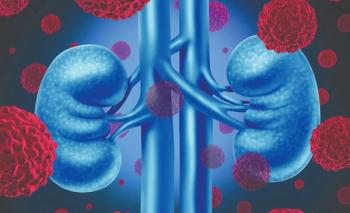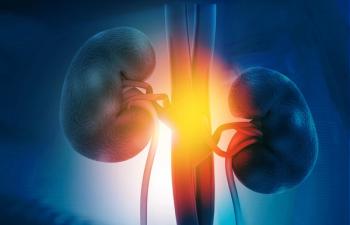
Early Intervention Important for Sunitinib-Related Hypertension in RCC
Patients with metastatic renal cell carcinoma treated with sunitinib often experience treatment-related hypertension and require rigorous blood pressure control.
Patients with metastatic renal cell carcinoma (RCC) treated with sunitinib often experience treatment-related hypertension (tHTN). A retrospective study
“Early intervention for tHTN might be important when blood pressure increases above the threshold of 140/90 mm Hg,” wrote researcher Philipp Ivanyi, MD, of Hanover Medical School, Germany, and colleagues. “In the absence of confounding factors (such as congestive heart failure), nondihydropyridine calcium channel blocker is the best way to quickly and reliably control tHTN.”
Sunitinib works by inhibiting the vascular endothelial growth factor (VEGF). In tumor cells, this signal inhibits tumor vasculature; however, in healthy cells it is associated with tHTN. Previous studies have shown a risk for hypertension among patients treated with VEGF receptor inhibitors and sunitinib, but because cardiovascular risk factors are common in patients with metastatic RCC, Ivanyi and colleagues wanted to explore the occurrence of this adverse event further.
They conducted a retrospective study of 72 patients with metastatic RCC treated with sunitinib from June 2004 to December 2011. They examined their medical records for risk factors for tHTN and antihypertensive treatments.
A little more than 70% of patients in the study developed tHTN after a median of 28 days on sunitinib. The mean blood pressure increased from 130/75 mm Hg on day 1 to 140/80 mm Hg on day 28. Only patients with tHTN had significant increases in blood pressure while on sunitinib.
The researchers found that a standard dose of sunitinib, age older than 50 years, and prehypertension were all independent risk factors for developing tHTN.
Antihypertensive therapies significantly reduced blood pressure among patients with tHTN. Among the patients diagnosed with tHTN, 70.8% received some kind of antihypertensive treatment and 72.5% received at last one modification of the antihypertension therapy at a median of 3 days after detection of tHTN. Calcium channel blockers were significantly better at controlling tHTN compared with other drugs (P = .045).
The researchers said that the results of this study should be interpreted with caution.
“In particular, the predominantly administered calcium channel blocker might cause an overestimation of its true efficacy in our statistical model,” they wrote. In addition, within the study period there were patients lost to follow-up or incomplete medical records.
Routine and permanent blood pressure monitoring should be considered in patients at high risk of tHTN, the researchers wrote, including patients older than 50 years of age, with pre-hypertension, or with a once daily sunitinib starting dose of 50 mg. “If control of tHTN is inadequate, an early combination of agents with different mechanisms of action may provide better control of tHTN.”
Newsletter
Stay up to date on recent advances in the multidisciplinary approach to cancer.



















































